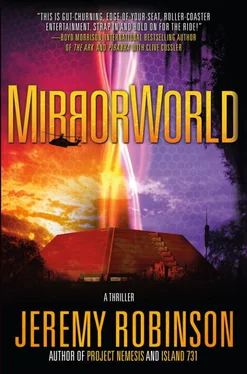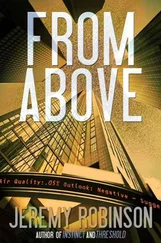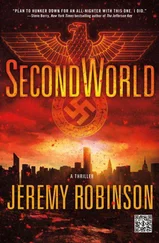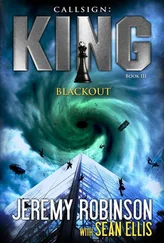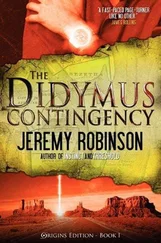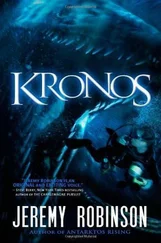“Two.”
“I’m going to need them, I think.”
“They’re all yours.”
Cobb stands, walks to the fridge. While he’s gone, I open the peanut butter and disrobe the pepperoni. On some level, I know this snack is disgusting, but I’m craving protein, salt, and fluids. I dip the pepperoni into the peanut butter, scoop up a thick glob, and take a bite. The supernova of powerful flavors is nearly overwhelming. The food at SafeHaven was mass-produced, preservative-filled, cheap slop. This is a feast in comparison. All that time I was missing the scents of the world, I never realized I also missed flavor.
Cobb returns with his beers while I chew. I can see the revulsion in his face when he looks at my snack, but he doesn’t say anything. Before sitting, he turns on a window-mounted air conditioner.
I tip my head in thanks, chase my food down with a swig of beer, and say, “So, you’ve worked for Neuro for one month?”
“Yeah,” he says, and there’s not a trace of hesitation.
“And before that?”
“I was a paramedic for Portsmouth Regional.”
“Why the switch?”
“There was a fire. I saved a few people. A wild day—less wild than today, though. But it was front-page news, and two days later I got a call. A recruiter for Neuro. He said they wanted people like me, who could handle a crisis if one ever developed. I thought it was strange that a private company would want a paramedic on staff, but he offered double what I was making, and I thought it would be a quieter job.” He forces a grin. “Until today, it was.”
I believe him. He’d be acting squirrelly if he was lying to me. That’s good for him, but bad for me. Some intel would go a long way right now.
“What about you?” he asks. “Were you really… you know?” He twirls his index finger around an ear.
“Yup. SafeHaven. North of Concord.”
“I’ve heard of it. For what?”
“I don’t feel fear,” I say.
“Like at all?”
“Not even a little.”
“So, if I pulled a gun on you?” he asks.
“That would be a bad idea,” I tell him. “But, no.”
Cobb pops open his second beer. “So, no dreams about being naked in public places or late for a college test?”
“I’m… not sure if I dream, but no. And I don’t remember college.”
“Must have had a lot of fun,” Cobb says.
I shake my head. “I don’t remember anything beyond a year.”
“Geez…” Cobb leans forward, elbows on his knees. “What happened a year ago?”
“Hell if I know.”
“So, amnesia then?”
“That’s the diagnosis.”
Cobb scratches his chin. “But you remember some things, right? Like, you can speak English. You can drive—very well, by the way. What else?”
“I know how to hurt people,” I say. “And I’ve played this game. I don’t think you’re going to like where it leads.”
That kills his curiosity. He leans back, wiping dew drops from the beer bottle. “Whoever you were before… that’s not who you are now?”
“I don’t know.” I shake my head. “This isn’t helpful.”
He takes a drink while I turn my thoughts inward. I don’t need to know who I am. Not right now, anyway. But what do I need? To get Shiloh someplace she’ll be cared for. And then what? Go back to Neuro and shut them down. I know I should just run. It’s what most people would do. They have a security force, some kind of black ops team, heavy weapons, and who knows what else. Definitely government-funded. But fleeing requires fear and the ability to look past what is right and wrong. I’m incapable of both.
“You worked at a hospital?” I ask.
“Portsmouth Regional.”
“How far?”
“Forty-minute drive.”
“Still know people there?”
He nods.
“Then that’s where we’re headed.”
“Now?” he asks, surprised.
“We’ll wait until Shiloh wakes up. See what she has to say.” I tilt my beer back. Polish it off. “If Neuro is out looking for us, they’ll have widened the search far beyond this place in just a few hours, and they won’t be looking for that sweet number out in the garage. If we take back roads and avoid tolls, we shouldn’t have any trouble getting to the hospital.”
“So we go to the hospital, and then what?”
I smile the kind of smile that also serves as an apology. “You’re going to help me get back inside Neuro.”
He groans, no doubt hoping that wouldn’t be the answer I gave. “And then ?”
I dip the pepperoni in the peanut butter, take a bite, and, with a full mouth, say, “You should probably… start looking… for a new job.”
“And what if they just kill you?” he asks.
“They won’t.”
“’Cause you’re sooo good at hurting people?”
I smile, genuinely, and dig the plastic case containing the syringe out of my pocket. “Because I have this.”
He leans forward, looking at the syringe behind the clear plastic cover. “And that is?”
“I have no idea.”
“What do you know?”
“That they’ve killed a lot people to create this.” I tap the plastic case. “And that they will kill me to retrieve it. I’m just never going to give them the chance.”
Full of pepperoni and peanut butter, I lounge back on the couch, lost in thought. About Neuro, the things I saw there, and Shiloh. It all made some kind of twisted sense when I first saw everything. But now, in retrospect, it’s a mess. Too many questions remain unanswered, but doubt has begun weakening my resolve. It wouldn’t be the first time my lack of fear has caused me to act without thinking beyond immediate circumstances.
It’s not that the horrible things I saw no longer seem horrible, it’s that Allenby was downright likable. And I don’t think it was an act. She struck me as a good person, and I’m a fairly good, and quick, judge of character. So how could she abide such lethal human experimentation?
Part of me says she couldn’t. That’s where the doubt comes from.
And here’s the thing about doubt. It changes nothing. While I may not be 100 percent certain in my verdict about Neuro, I have no fear of discovering I’m wrong, even if I’ve already reduced the building to a pile of rubble. I should probably still be locked up. I recognize the flaw. But it doesn’t change anything.
The large-screen TV blinks on.
“Do you mind?” Cobb asks, remote in hand.
I shake my head. “What time is it?”
Cobb looks at his watch. “Eleven in the A.M.”
“ Price Is Right is on,” I say. “Channel seven.”
Instead of punching in the number, Cobb surfs through the channels, one digit at a time, counting down from 347. Around 300 he starts hitting the cable news networks. The images I see on each are very similar.
And familiar.
“Wait,” I say. He stops two channels past the news networks. “Go back.”
The TV blinks twice and then displays an aerial view of New York City. The streets are full of people, swarming about. I can’t tell if it’s a protest or a riot, but if things turned violent in Manchester, New Hampshire, the atmosphere in New York must be worse. “What’s happening?”
“What, the riots?” Cobb looks confused. “You don’t know?”
“I’ve been in an institution,” I remind him.
“Right.” He turns back to the screen.
People swirl through the streets, entering and leaving shattered storefronts, taking part in or cheering on several brawls. SafeHaven now seems like an asylum for the sane compared to the scene unfolding in New York.
“It started in the largest cities with the highest violent crime rates. Detroit. Memphis. St. Louis. They were small protests at first, but there was no unified theme. People just seemed to be protesting whatever made them afraid. The government. Wall Street. GMO foods. The protests grew in size and spread to the larger cities. Los Angeles. New York. Washington, D.C. For a week, this is how it went. Until Portland.”
Читать дальше
